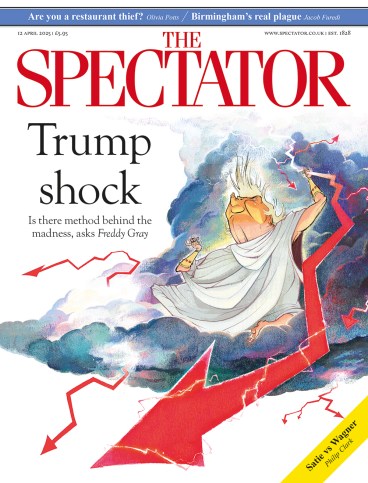
Ceremonial cannibalism was not a European invention but a regular feature of South American societies
Simon Park, who teaches Portuguese history and literature at Oxford University, aims to recast the early period of European exploration as a story of disasters rather than successes. His target is the notion that those who led the first European expeditions across the Atlantic or into the Indian Ocean were ‘heroes who pushed forward boundaries of knowledge’. An obvious case is Christopher Columbus, who refused to his dying day to recognise that he had failed to reach the outlying islands of China. He was already the butt of bitter criticism during his lifetime. Vasco da Gama, who opened the route from Portugal to India, has recently been vividly portrayed by Roger Crowley in his book Conquerors as a ruthless invader who thought nothing of bombarding towns into submission. Ferdinand Magellan, the subject of a chapter in Park’s book, has been brilliantly demythologised by Felipe Fernandez Armesto in his book Straits. Park also discusses the English explorer Martin Frobisher, who imagined he had found gold in the icy wastes of northern Canada when all he brought home was rubble flecked with iron pyrites, ‘fool’s gold’. In re-assessing these figures, Park is pushing against an open door.
Shipwrecks have become a favourite topic of historians, with good reason: what they contain provides a snapshot of a moment in time. They feature prominently in this book, too, but Park concentrates on the ambitions of those who served aboard the ships. He observes that geographical curiosity was of secondary significance, and that the principal aim of these voyages was the search for wealth.
This meant not just the crews’ own enrichment but their sovereigns’, though some, like the Portuguese Magellan, were willing to serve other rulers (in his case the king of Spain), if they offered the political and, ideally, financial backing they needed. Ambitions of this sort, Park argues, meant that they set out full of ‘envy, usually concealed by noisy arrogance’. Sometimes, as in the case of Hernan Cortes and his conquest of Mexico, they achieved far more than they could have hoped. But often they lost their way in uncharted seas. The risk of failure was high. Between 1500 and 1550, roughly one in eight Portuguese ships on the passage to India foundered. The problem with such statistics is that many ships that ended up at the bottom of the sea had previously made a number of return voyages.
Ultimately, though, Park is writing not about wrecks, but about the wrecking effect of European attempts to create overseas empires. The 16th-century Portuguese empire bore little similarity to Salazar’s conception 400 years later. The original aim was to create trading bases in India and beyond. Park nicely comments that European explorers were ‘maritime moths lured by the trading beacons of other continents’.
Built around a series of micro-histories of lost or deluded explorers, Wreckers constantly breaks off just when events become exciting. Da Gama’s visit to a lavish Hindu temple in Calicut and his eager assumption that it was a church dedicated to the Virgin Mary is ignored. The account of Magellan’s voyage ends abruptly with Magellan’s death in battle in the Philippines, while the rest of the circumnavigation is omitted. Instead Park offers comments on a modern Filipino art installation featuring Magellan, Marilyn Monroe and Mickey Mouse, in an attempt to compensate for the lack of Filipino sources by ‘pushing back against the authority of written history’.
Sometimes Park examines Europeans who found themselves living among indigenous peoples. Occasionally they went native, like the Spanish sailor Gonzalo Guerrero, who made a home with the Maya of Yucatan. His face was etched with Maya tattoos. Hans Staden, a German gunner captured in Brazil in 1552, left a record of his hair-raising experiences as he awaited the cannibal feast where he was to be the main meal, which fortunately never happened. Unlike others who have written about the Tupí peoples of South America, Park has the good sense to accept that ceremonial cannibalism was not an invention of European fantasists but a regular feature of these societies. Victims (other than European captives) accepted their fate without demur.

Park is interested in evidence that the native inhabitants of lands penetrated by Portuguese, Spanish, French and English explorers resisted the blandishments of their would-be masters, which often consisted of rusty nails, broken mirrors and other baubles. He writes: ‘It is crucial that we recover forgotten voices and neglected sources in our collective attempts to decolonise the past.’ He is a fan of the repatriation of museum objects and takes the view that ‘the choice to leave the past in the past is politically, intellectually and morally impossible… It still feels unfixed’. History is, he mysteriously opines: ‘A space of possibilities – then, now and in the future.’
One cannot write what qualifies as history in this way. Nor can we heap blame only on western European empires without remembering the existence of other great empires of the same era, among them the Ottomans in Turkey, the Balkans and the Indian Ocean; Russians under Ivan the Terrible; and the Aztecs and Incas in the Americas. Moreover, European conquerors easily found associates who were looking for help with their own military campaigns, whether the Hindu allies Park mentions during the Portuguese conquest of Goa or Cortes’s Mexican supporters. This is a book that preaches too persistently, and pretentiously embraces views about how history should be written that obscure rather than illuminate our understanding of the past.










Comments